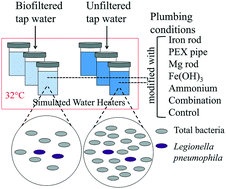当前位置:
X-MOL 学术
›
Environ. Sci.: Water Res. Technol.
›
论文详情
Our official English website, www.x-mol.net, welcomes your
feedback! (Note: you will need to create a separate account there.)
Mediation of effects of biofiltration on bacterial regrowth, Legionella pneumophila, and the microbial community structure under hot water plumbing conditions
Environmental Science: Water Research & Technology ( IF 3.5 ) Pub Date : 2017-10-25 00:00:00 , DOI: 10.1039/c7ew00301c Dongjuan Dai 1, 2, 3, 4 , Caitlin R. Proctor 1, 2, 3, 4 , Krista Williams 1, 2, 3, 4 , Marc A. Edwards 1, 2, 3, 4 , Amy Pruden 1, 2, 3, 4
Environmental Science: Water Research & Technology ( IF 3.5 ) Pub Date : 2017-10-25 00:00:00 , DOI: 10.1039/c7ew00301c Dongjuan Dai 1, 2, 3, 4 , Caitlin R. Proctor 1, 2, 3, 4 , Krista Williams 1, 2, 3, 4 , Marc A. Edwards 1, 2, 3, 4 , Amy Pruden 1, 2, 3, 4
Affiliation

|
While limiting organic carbon through biofiltration controls microbial regrowth in drinking water main distribution systems, little is known about its effectiveness for building water plumbing systems. Here we examined regrowth under eight plumbing conditions: pipe material (iron or cross-linked polyethylene (PEX)), corrosion control (magnesium rod, elevated pH), corrosion sediments (Fe(OH)3), nitrification (ammonium addition), a combination of magnesium rod/iron pipe/ammonium, and a no-modification control using simulated water heaters (SWHs) fed with biofiltered or unfiltered water and incubated at 32 °C. While biofiltration did effectively limit total bacterial numbers (half-log less), it did not offer protection against Legionella pneumophila. By the end of study (day 448), some conditions acted synergistically with (PEX, ammonium) or independently of (magnesium rod, combination) influent biofiltration to increase L. pneumophila numbers. Illumina sequencing of 16S rRNA genes confirmed the enrichment of phylogenetic groups associated with expected functions (e.g., ammonium, iron, and hydrogen oxidation) under corresponding plumbing modifications and also revealed that biofiltration had an overarching influence on the microbial community structure in the control, Fe(OH)3, and combination conditions. This study demonstrates that a variety of factors under warm water plumbing conditions can override potential influences of upstream biofiltration on L. pneumophila growth.
中文翻译:

热水管道条件下生物滤池对细菌再生,嗜肺军团菌和微生物群落结构的影响的中介作用
尽管通过生物过滤限制有机碳可控制饮用水主分配系统中的微生物再生,但人们对其建立水暖系统的有效性知之甚少。在这里,我们检查了八种管道条件下的再生长:管道材料(铁或交联聚乙烯(PEX)),腐蚀控制(镁棒,pH升高),腐蚀沉积物(Fe(OH)3),硝化作用(添加铵),镁棒/铁管/铵盐的组合,以及使用装有生物过滤或未过滤水并在32°C下孵育的模拟热水器(SWH)进行的无修改控制。尽管生物过滤确实有效地限制了细菌总数(减少了半数对数),但它并未提供针对军团菌肺炎的保护作用。到研究结束(第448天),某些情况与(PEX,铵)协同作用或独立于(镁棒,组合)进水生物滤池增加了嗜肺乳杆菌的数量。对16S rRNA基因的Illumina测序证实,在相应的管道改造下,与预期功能(例如,铵,铁和氢氧化)相关的系统发生基团的富集,并且还揭示了生物滤过对对照中的微生物群落结构具有总体影响(OH)3,以及结合条件。这项研究表明,在温水管道条件下的多种因素可以克服上游生物滤池对嗜肺乳杆菌生长的潜在影响。
更新日期:2017-11-16
中文翻译:

热水管道条件下生物滤池对细菌再生,嗜肺军团菌和微生物群落结构的影响的中介作用
尽管通过生物过滤限制有机碳可控制饮用水主分配系统中的微生物再生,但人们对其建立水暖系统的有效性知之甚少。在这里,我们检查了八种管道条件下的再生长:管道材料(铁或交联聚乙烯(PEX)),腐蚀控制(镁棒,pH升高),腐蚀沉积物(Fe(OH)3),硝化作用(添加铵),镁棒/铁管/铵盐的组合,以及使用装有生物过滤或未过滤水并在32°C下孵育的模拟热水器(SWH)进行的无修改控制。尽管生物过滤确实有效地限制了细菌总数(减少了半数对数),但它并未提供针对军团菌肺炎的保护作用。到研究结束(第448天),某些情况与(PEX,铵)协同作用或独立于(镁棒,组合)进水生物滤池增加了嗜肺乳杆菌的数量。对16S rRNA基因的Illumina测序证实,在相应的管道改造下,与预期功能(例如,铵,铁和氢氧化)相关的系统发生基团的富集,并且还揭示了生物滤过对对照中的微生物群落结构具有总体影响(OH)3,以及结合条件。这项研究表明,在温水管道条件下的多种因素可以克服上游生物滤池对嗜肺乳杆菌生长的潜在影响。











































 京公网安备 11010802027423号
京公网安备 11010802027423号